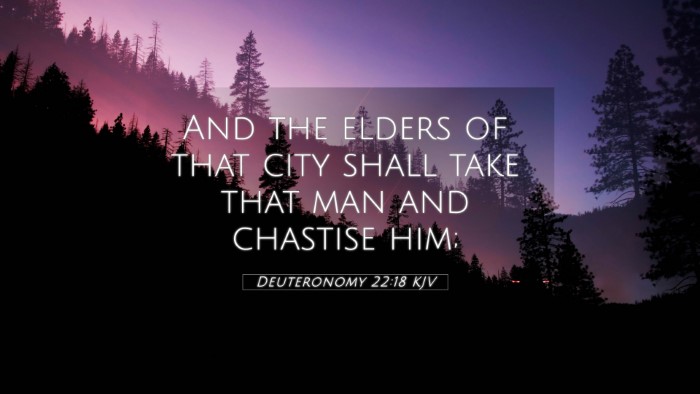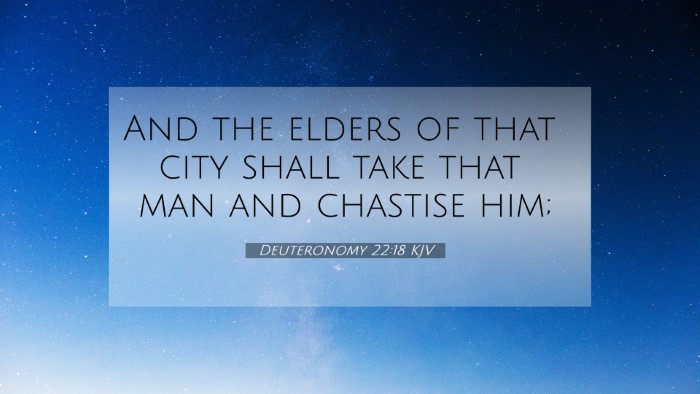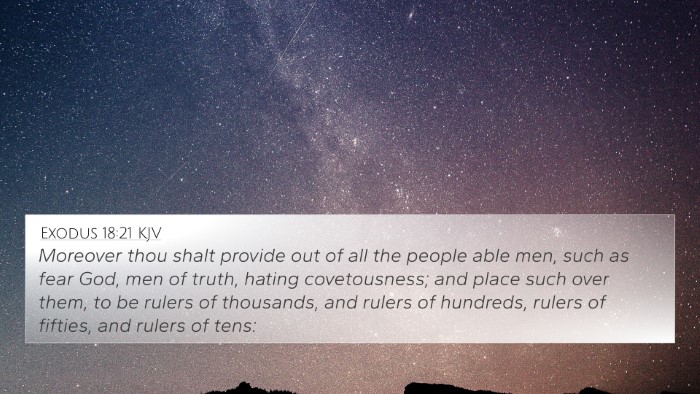Understanding Deuteronomy 22:18
Deuteronomy 22:18 states: "And the elders of that city shall take that man and chastise him." This verse is situated within the broader context of laws concerning morality and societal conduct within Israelite communities.
Key Themes and Meanings
This passage pertains to the legal framework in ancient Israel regarding the behavior of individuals and the consequences of their actions. The verse highlights the role of community leaders—the elders—in maintaining moral standards among the people.
Insights from Commentaries
- Matthew Henry: He interprets this verse within the context of communal responsibility. Henry emphasizes that moral law is not merely about individual conduct but also about the health of the community. The elders' role is to guide and correct while underscoring the seriousness of moral infractions.
- Albert Barnes: Barnes discusses the idea of chastisement as a means of discipline aimed at restoration rather than mere punishment. He draws a parallel to New Testament teachings on church discipline, where the goal is to restore the sinner to fellowship.
- Adam Clarke: Clarke examines the legal implications, noting that this practice was essential to deter misconduct and uphold societal norms. He provides historical context to illustrate how such laws functioned within Israel and were considered essential for the community's spiritual welfare.
Cross-References to Deuteronomy 22:18
Connecting this verse with other biblical texts enhances our understanding. Here are several related verses that provide deeper insight:
- Deuteronomy 19:15: This verse establishes how witnesses should be treated, which ties into the accountability themes in Deuteronomy 22:18.
- Matthew 18:15-17: In the New Testament, Jesus addresses correction within the community, illustrating continuity in the theme of accountability throughout scripture.
- Galatians 6:1: Paul encourages restoring a brother caught in sin, echoed in the restorative intent behind the chastisement mentioned in Deuteronomy.
- 1 Corinthians 5:12-13: Discusses the church's responsibility to judge those within and contrasts it with the role of external judgments, paralleling the use of communal leadership in Deuteronomy.
- Proverbs 3:11-12: Here, the idea of discipline is framed as an act of love from God, showing how God’s enactment of discipline through community leaders operates on similar principles.
- Titus 3:10: This verse advises rejecting divisive people after a first and second warning, similar to corrective measures taken by the elders in Deuteronomy.
- Romans 13:1-4: Speaks to the role of government and order in society, linking civil authority to moral governance as seen in the roles of elders in the community.
Connections Between Bible Verses
The connections between these verses showcase a thematic thread running through the Bible—from the Old Testament's laws and community governance to the New Testament’s principles of church discipline and moral accountability.
Using Biblical Cross-Referencing Tools
For those wanting to delve deeper into the interconnections of scriptural texts, there are various tools for Bible cross-referencing available. Utilizing a Bible concordance or a cross-reference Bible study guide can provide valuable resources to explore Bible verses that relate to each other.
Effective Cross-Referencing Bible Study Methods
Understanding the cross-reference system involves identifying key themes and words in scripture. For instance:
- Look for repeated themes like discipline, community governance, and restoration.
- Explore connections between Old Testament guidelines and New Testament practices.
- Study the contextual background of related verses to grasp the intended messages fully.
Conclusion
Deuteronomy 22:18 emphasizes the importance of moral accountability, the role of community leaders, and the restorative nature of discipline in a society. By fostering a deep understanding of such scriptures through comparative Bible verse analysis, believers can appreciate the continuity of God’s guidance across both the Old and New Testaments.



